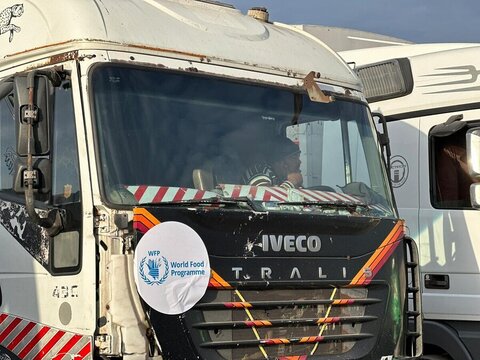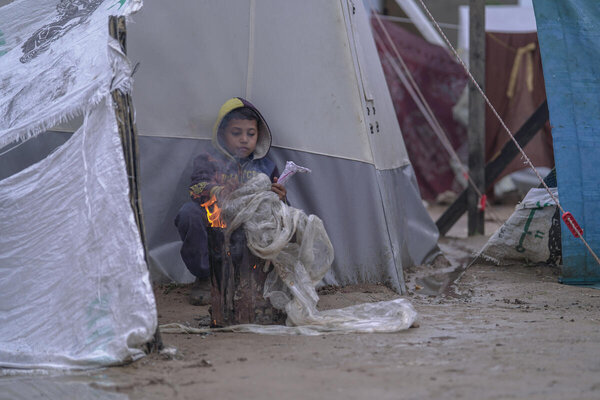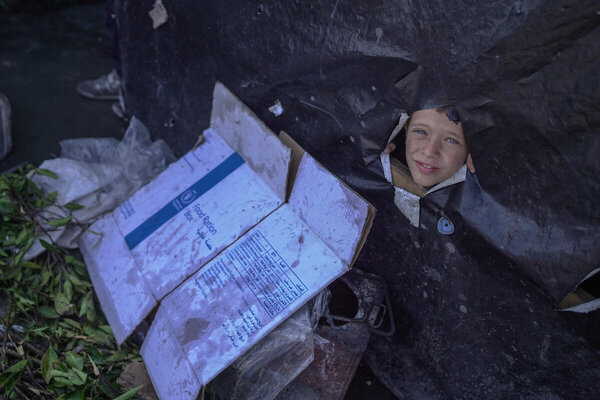Gaza: WFP forced to pause food distributions in north as report warns of worsening crisis

Hungry, thirsty and weak, more and more Gazans are falling sick, according to a report published this week.
At least 90 per cent of children aged under 5 are affected by one or more infectious diseases, with 70 percent having had diarrhoea in the past two weeks, according to analysis from the Global Nutrition Cluster.
“An immediate humanitarian ceasefire continues to provide the best chance to save lives and end suffering,” the World Food Programme, UNICEF and the World Health Organization said in a statement.
“If the conflict doesn’t end now, children’s nutrition will continue to plummet, leading to preventable deaths or health issues which will affect the children of Gaza for the rest of their lives and have intergenerational consequences,” said UNICEF’s deputy executive director for humanitarian action and supply operations, Ted Chaiban.
Hunger’s border: Why aid trucks taking humanitarian gear and food into Gaza face long waits

High levels of disease, the severe shortage of food and clean water, and the almost total collapse of health services are compounding child wasting and making every day a struggle to survive for adults.
Nutrition screenings conducted at shelters and health centres found that 15.6 per cent of children under 2 are acutely malnourished. Of these, almost 3 per cent have the most severe form of malnutrition, which puts them at highest risk of dying without urgent treatment.


Valerie Guarnieri, World Food Programme Assistant Executive Director for Programme Operations, has called for “decisive improvements on security and humanitarian access, and additional entry points for aid to enter Gaza.”
The situation in North Gaza is particularly alarming. WFP has been forced to pause operations there “until conditions are in place that allow for safe distributions”.
“The decision to pause deliveries to the north of the Gaza Strip has not been taken lightly, as we know it means the situation there will deteriorate further and more people risk dying of hunger,” WFP said in a statement.

WFP is deeply committed to urgently reaching desperate people across Gaza but the safety and security to deliver critical food aid – and for the people receiving it – must be ensured.
“Imagine being so hungry you are willing to run into gunfire to collect food. That’s a reflection of the level of desperation people of Gaza are facing today,” said Matthew Hollingworth, World Food Programme Country Director for Palestine.
Voices from Gaza: 'My priority is keeping my children warm. I cannot think of myself, or my unborn child'
By Nour Hammad

Ikhlas and her three children are among families on the frontline of both conflict and hunger. They left their home in the Jabalia refugee camp in North Gaza amid bombing and tank fire. “All I was thinking about was keeping them safe,” she says.
“(UN-run) schools were the only shelters available for me and my kids. I came into a classroom full of women and they welcomed me.”
Ikhlas is nine months pregnant and responsible for feeding her three children. Every meal is an ordeal. Finding a spot to sleep in at night is a challenge.
‘The children are always sick, they have constant diarrhoea and sometimes they get fever’
Despite her best efforts, with war in its 20th week, she’s not been able to cook a nourishing meal for her children due to a lack of cooking utensils and fuel. Not to mention the lack of food.
Ikhlas depends on the assistance distributed in UN shelters to feed her children – mostly cheese and cold canned food.

“The children are always sick, they have constant diarrhoea and sometimes they get fevers,” she explains.
Like many mothers, Ikhlas chooses to skip meals to feed her children. “I am pregnant, alone, taking care of three children,” she says.
“My only priority is keeping them fed and warm. I cannot think of myself, or my unborn child. I cannot think of how I will feed her, or dress her, or how I will even give birth. Tomorrow is too distant, I can barely get through the day.”

Alongside general food assistance parcels, WFP is providing a nutrient- and calorie-dense specialized nutritious food (SNF) for pregnant and breastfeeding mothers, as well as children aged under 5 years old. The SNFs contain a range of vitamins and minerals, essential fatty acids and proteins.
“When they gave it to us, my kids liked it and I noticed that it was filling them up. It’s my greatest joy when they go to bed warm and full,” says Ikhlas.
So far 40,000 children and mothers have already received SNFs. WFP aims to reach 450,000 more in coming days. Continuing this mission, however, depends on the safe, regular access to Gaza that WFP and its humanitarian partners are calling for.

In the whole month of January, WFP only managed to get four convoys into Gaza – that’s around 35 truckloads of food, enough for almost 130,000 people. “This is really not enough to prevent a famine, and we know levels of hunger in Gaza City are already at that level or getting to that level,” said WFP’s Hollingworth.
“We need the fighting to stop,” he added, speaking to the media. “If the warfare is over, we can get about the business of making sure that we can get sufficient assistance into all areas of the Strip.”
For Gazans, meat, eggs and cooked meals have become a thing of the past.
“A pack of eggs is now 30 shekels (around US$10),” says Muna, a mother who was also forced to flee with her family under fire. “I would still buy them despite the high price… but I can’t even find them now,” she adds.

“Before the war, I told myself I would stop breastfeeding my (18-month-old) daughter when she started walking,” she recalls. Her daughter took her first steps on October 6 – after which all she knew fell apart.
“I couldn’t stop breastfeeding now. How else can I feed her?” says Muna, whose family have not had access to proper food in three months. “I breastfeed my daughter day and night. I am tired. I don’t eat enough, and I am not eating the healthy foods to nourish her with my milk.”

“My daughter used to cry all night long, waking up hungry,” she says. “This stopped when I started giving her the special food. It keeps her full, and that helps her sleep better.”
In conflict-riven Gaza it takes the joint efforts of mothers and the humanitarian community to keep any child safe and nourished. WFP continues to support parents’ efforts in ensuring the wellbeing of their children, from providing high-energy biscuits, food parcels and hot meals, to SNFs.
In a recent media interview, Hollingworth neatly summed up the situation. “Gaza today looks entirely different than it did four months ago,” he said. “Half the buildings across the entirety of the Strip are rubble. It’s congested. It’s dirty. There’s no, or limited, clean water. It’s a public healthcare crisis as well as a hunger crisis. We desperately need significant amounts of aid to get into Gaza every single day.”



